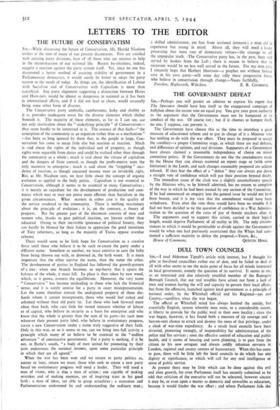THE FUTURE OF CONSERVATISM
LETTERS TO THE EDITOR
Sta,—While discussing the future of Conservatism, Mr. Harold Nicolson strikes at the root of many of our present discontents. Few are satisfied with existing party divisions, least of all those who are anxious to help in the reconstruction of our national life. Recent by-elections, indeed, suggest a reaction against the party system itself. Yet, since no one has discovered a better method of assuring stability of government in a Parliamentary democracy, it would surely be better to adapt the party system to the needs of today. As things are, the identification of Labour with Socialism and of Conservatives with Capitalism is more than superficial. Any party alignment suggesting a distinction between Haves and Have-nots would be almost as dangerous in national as it has been in international affairs, and if it did not lead to chaos, would assuredly bring some other form of disaster.
The Conservative party umbrella, cumbersome, leaky and shabby as it is, provides inadequate cover for the diverse elements which shelter beneath it. The majority of those elements, as far as I can see, are not only inarticulate about the " underlying principle" of Conservatism— they seem hardly to be interested in it. The essence of that faith—" the conception of the community as an organism rather than as a mechanism " —has been so long ignored by them that, to the people at large, Con- servatism has come to mean little else but reaction or inaction. Much is said about the rights of the individual and of property, as though rights were separable from duties and could be realised other than through the community as a whole ; much is said about the virtues of capitalism and the dangers of State control, as though the profit-motive were the only incentive to enterprise ; much is said about the "crippling "
inci- dence of taxation, as though unearned income were an inviolable right. But, as Mr. Nicolson says, we hear little about the concept of organic evolution as applied to the body politic. Capitalism is not essential to Conservatism, although it seems to be essential to many Conservatives ; it is merely an expedient for the development of production and com- merce which may or may not prove more efficient than Socialism in the given circumstances. What matters in either case is the quality of the service rendered to the community. There is nothing reactionary about the principle of evolution ; it is, on the contrary, a theory of
progress. But the greater part of the electorate consists of men and women who, thanks to past political inaction, are literate rather than educated. Owing to their inevitable ignorance of political history, they can hardly be blamed for their failure to appreciate the good intentions of Tory reformers, so long as the majority of Tories oppose overdue reforms.
There would seem to be little hope for Conservatism as a creative force until those who believe it to be such re-create the party under a different name. Somehow or another, we must contrive to save the baby from being thrown out with, or drowned in, the bath water. It is more important that the ethos survive the name, than the name the ethos. The development of parties in England has followed the growth-pattern of-a tree: when one branch becomes so top-heavy that it upsets the balance of the whole, it must fall. Its place is then taken by new wood, which, as it grows, restores the equilibrium. Moreover, the very name " Conservative " has become misleading to those who lack the historical sense, and it is surely unwise for a party to court misrepresentation. Let the name therefore remain the undisputed property of those die-
hards whom it cannot misrepresent, those who would feel naked and ashamed without their old party tie. Let those who look forward more often than back, who care little for vested interests whether of labour or of capital, who believe in security as a basis for enterprise and who know that the whole is greater than the sum of its parts—let such men whatever their present party label, who believe in evolutionary progress, create a new Conservatism under a name truly suggestive of their faith. Only in this way, or so it seems to me, can we bring into full activity a principle which many of us believe to be essential to the " endless adventure " of constructive government. For a party is nothing, if it be not, in Burke's words, " a body of men united for promoting by their joint endeavours the national interest, upon some particular principle in which they are all agreed."
When the war has been won and we return to party politics as, sooner or later, return we must, those who seek to create a new party based on evolutionary progress will need a leader. They will need a man of vision, who is also a man of action ; one capable of making mistakes and of making enemies, yet of inspiring mist in his good faith ; a man of ideas, yet able to grasp actualities ; a statesman and Parliamentarian• Understood. by and understanding the ordinary man;
a skilled administrator, yet free from sectional interests ; a man old in experience but young in mind. Above all, they will need a leader possessing that most rare of democratic virtues—the courage to tell the unpopular truth. 'The Conservative-party has, in the past, been well served by leaders from the Left ; there is reason to believe that its successor would be no less well served in the future. For my own part, I sincerely hope that Herbert Morrison—a prophet not without honour save in his own party—will some day rally those progressive forces who believe in conservation through change.—Yours faithfully,


























 Previous page
Previous page